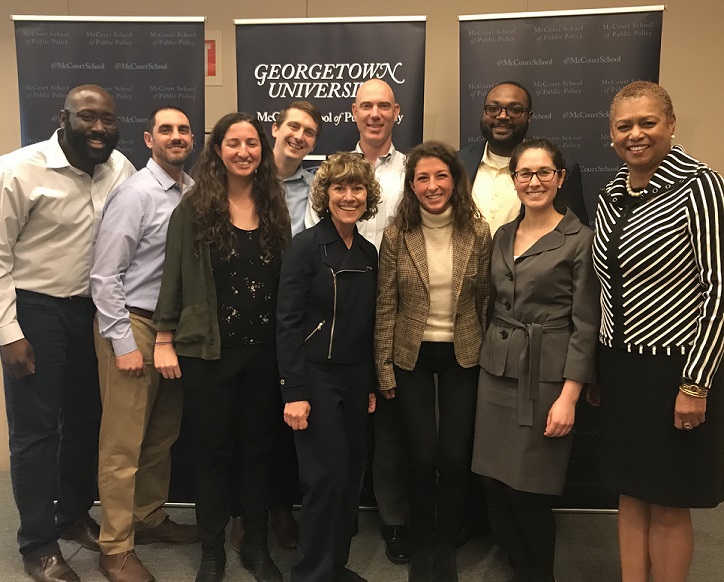McCourt’s Center for Public & Nonprofit Leadership Awards Racial Equity Grants
Three nonprofits were presented with monetary awards from the McCourt School of Public Policy’s Center for Public & Nonprofit Leadership (CPNL) on April 17 during an event on “Advancing Racial Equity: Practical Steps for Philanthropists and Nonprofits.”

– Three nonprofits were presented with monetary awards from the McCourt School of Public Policy’s Center for Public & Nonprofit Leadership (CPNL) on April 17 during an event on “Advancing Racial Equity: Practical Steps for Philanthropists and Nonprofits.”
CPNL Director Kathy Kretman, who also serves as McCourt’s Waldemar A. Nielsen Chair in Philanthropy, hosted the event to showcase the role students can play in tackling racial injustice.
At the event, students had the opportunity to award grants totaling ,000 to three nonprofits in D.C. working on racial justice.
Race and Philanthropy
“What does racial equity mean? What does grantmaking with a racial equity lens look like?” said Kretman, also a McCourt research professor. “These are the questions we posed to our students. We want to engage students in the conversations about race and philanthropy to get a fresh perspective.”
Kretman co-teaches a new course with Tamara Copeland, president of the Washington Regional Association of Grantmakers. The course, called Philanthropists’ Response to Racial Inequity in America: Why? How? What’s Next?, allows students to serve in the role of grantmakers, deciding which D.C. nonprofits they think would best benefit from grants for their work in advancing racial equity.
This year the recipients of the grants are Fair Budget Coalition (,000), ONE DC (00) and Public Allies DC (00). Each organization has its own approach to tackling racial inequity, Kretman said.
The Fair Budget Coalition focuses on coalition building and advocacy programs. ONE DC provides racial equity and implicit bias training for DC residents, and Public Allies DC provides District youth with opportunities to develop their leadership as community members.
Organizational Change
“The students decided that these organizations’ missions are aligned with their grantmaking mission organizations that are focused on systems change through advocacy, coalition building and developing D.C. youth to have a voice in public policy decisions that affect them,” Kretman explains.
“I see students wanting to engage in real conversations about race, but not having opportunities to examine their own lived experiences, assumptions and actions,” Kretman said.
Funding was supplied by the Learning By Giving Foundation and the Waldemar A. Nielsen Chair in Philanthropy endowment at the McCourt School.
“We are thankful for the opportunity provided by this learning experience,” said Disraeli Smith (MPP’18). “Ultimately, we struggled with the same things the philanthropic community is struggling with today – how to fund and measure projects, programs, organizations working towards racial equity.”
Smith and Caroline Cragin (MPP’19) are among the eight students enrolled in Kretman’s course this spring.
Cragin said the course “enabled me to really think critically and have a racial equity lens in the academic study of public policy.”
Assessing Racism
Luisa Boyarski, assistant director of CPNL, provided the findings of her study on what nonprofits are doing within their organizations to address racial equity, and Weizenegger, the Nielsen Student Fellow, shared his impact assessment of the philanthropic communities response to racial inequity in the region.
Weizenegger’s report explored the results of a six part series called Putting Racism on the Table, which was hosted by the Washington Regional Association of Grantmakers (WRAG). The learning series aimed to equip CEOs, presidents, and trustees of philanthropic organizations from across the greater Washington, with a fuller understanding of how racism impacts their organization.
“By focusing on a deep engagement with the subject, Putting Racism on the Table gave participants the tools to see their own work in a new light,” Weizenegger said. “We’re beginning to see how sustained action follows from understanding across the philanthropic community.”
The report by Boyarski identified some of the major challenges that nonprofits have in adopting racial equity policies and practices as part of their organizational culture, including lack of funding, difficulty finding training programs and limited board commitment.
“One promising finding of the research is that anyone can start this work–there is no correlation between the size of a nonprofit’s budget and how advanced they are in promoting racial equity,” said Boyarski. “There is a pathway with specific practices that many organizations are following to advance racial equity, providing suggested next steps for organizations, no matter where they are in their journey.”
Learn more:
The Center for Public and Nonprofit Leadership 2017-2018 Waldemar A. Nielsen Chair in Philanthropy Dr. Luisa Boyarski’s Report Edward Weizenegger’s Report